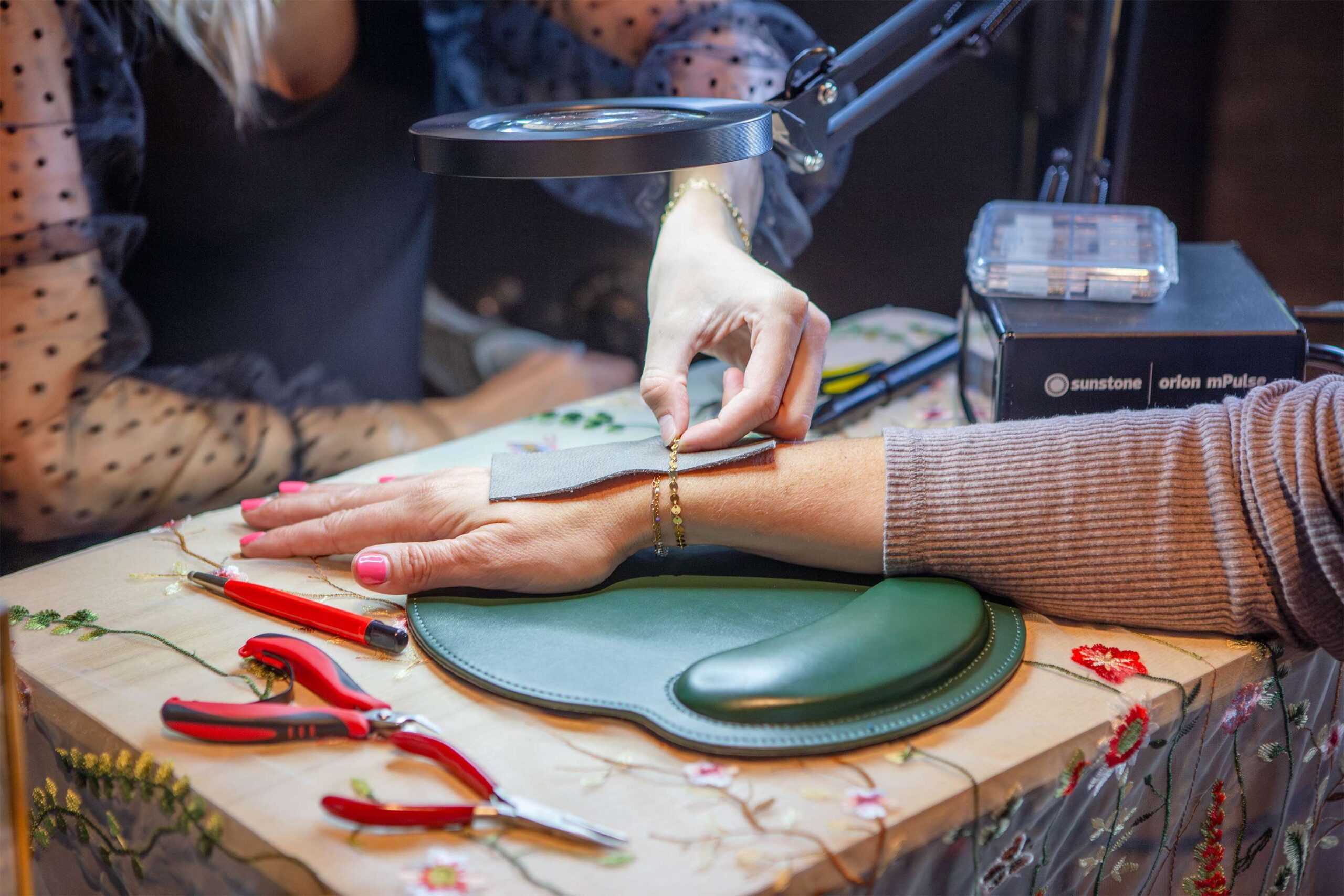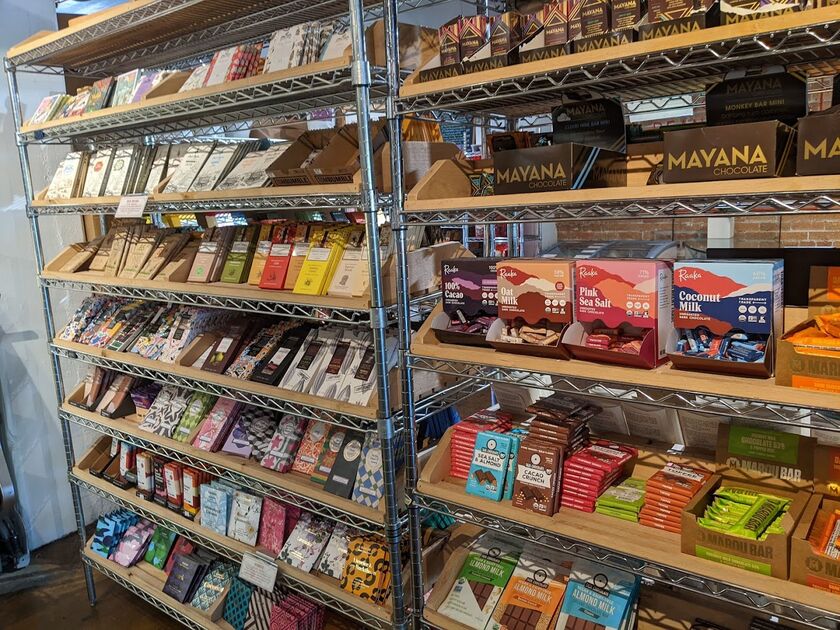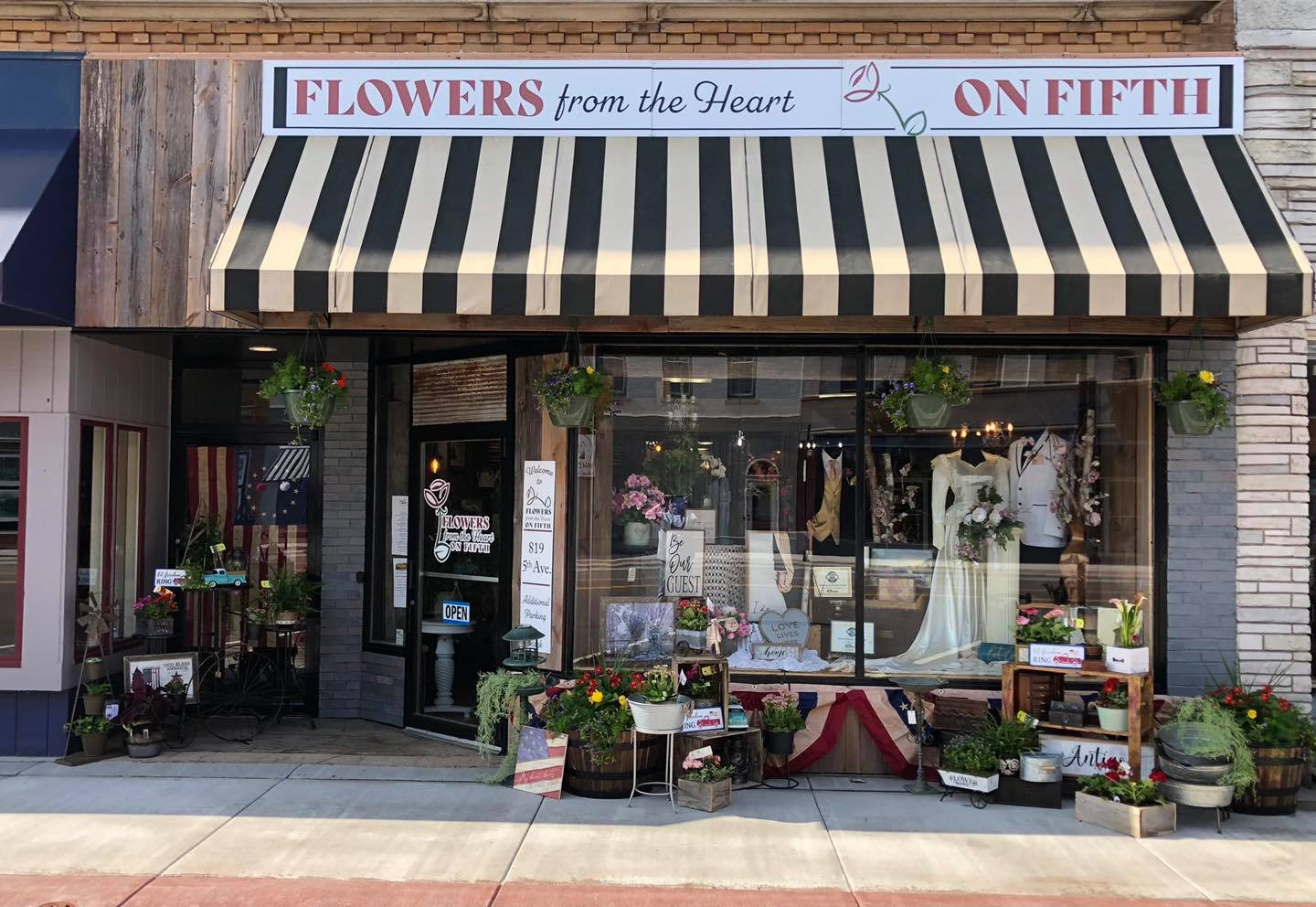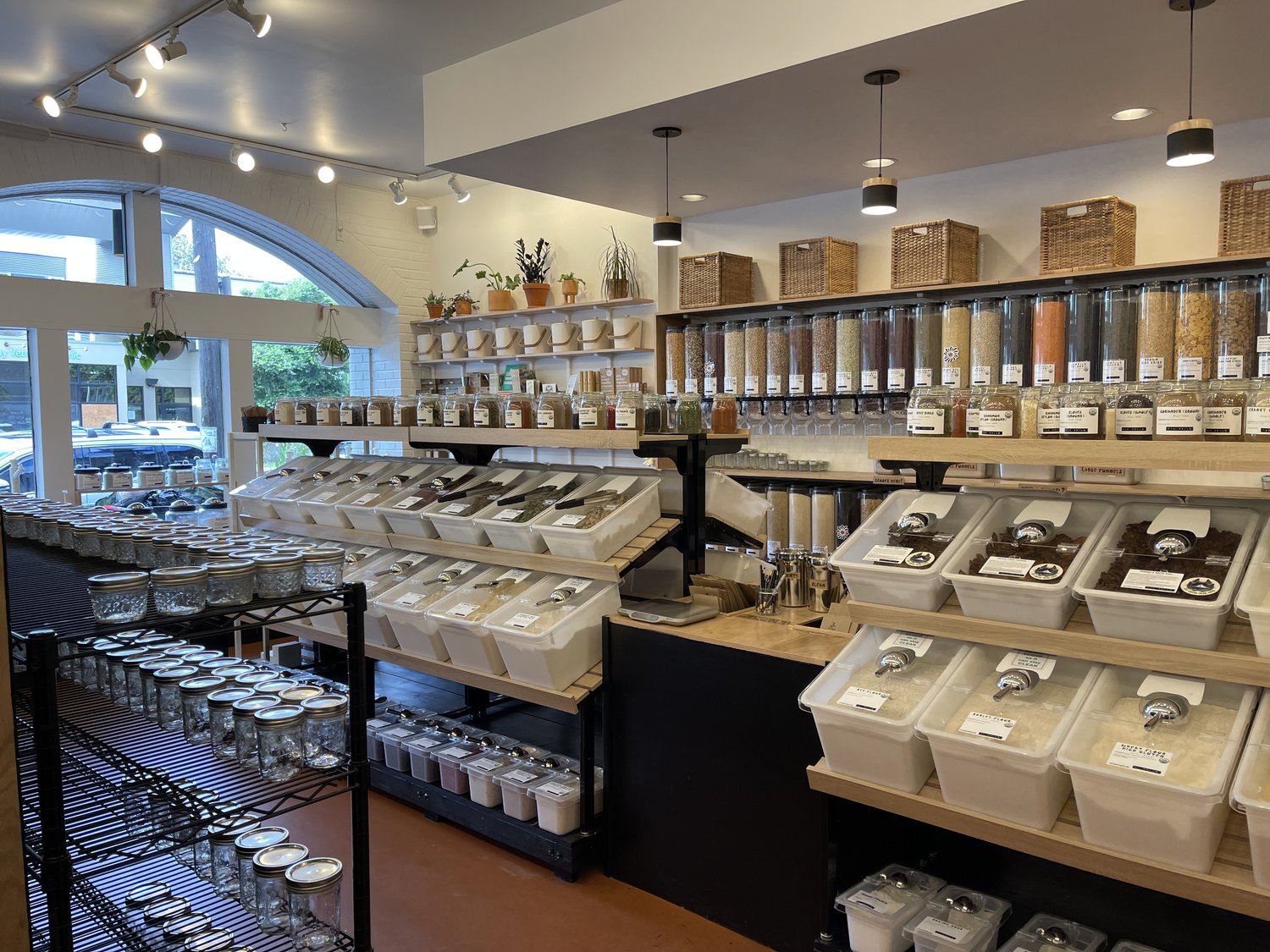Identifying retail business ideas that combine profitability, practicality, and passion is the first step in starting a successful venture.
Retail offers the unique opportunity for small and independent businesses to carve out a niche for themselves and provide consumers with something they can’t get elsewhere. We’ve compiled a list of 27 unique retail store ideas with proven potential for lasting success:
Retail Business Ideas That Don’t Require a Storefront
1. Permanent Jewelry Application
Permanent jewelry—offering custom-fitted and welded bracelets, necklaces, and rings that are meant to be worn indefinitely—represents a unique niche in the jewelry market. This booming trend caters to customers looking for a personal and lasting symbol of significant moments or relationships. It does require an understanding of a few basic jewelry repair techniques (including metal manipulation and welding) as well as an initial investment in equipment and stock.
These businesses are typically mobile, allowing for services to be brought directly to the customer—offering a unique and personal souvenir for guests at parties, weddings, and special events.
Permanent jewelry involves using pliers and portable welding equipment to apply bracelets or necklaces without a latch. (Source: Corazon Sterling Silver)
2. Cleaning Services
Launching a cleaning service caters to the increasing demand for residential and commercial cleaning solutions. A key advantage of cleaning services is that startup costs are mostly from equipment and supplies (like disinfectants, a broom, mop, vacuum, etc.), making them lower than many other retail business ideas. By focusing on a mobile setup, you can also sidestep the cost of maintaining a storefront or office lease.
Offering customizable cleaning packages, from deep cleaning to routine maintenance, allows you to address the specific needs of each client. Building trust through reliable, high-quality service and professional customer interactions is key to establishing a loyal clientele and benefiting from word-of-mouth referrals.
3. Computer Repair Services
In a technology-driven world, computer repair services meet a critical need by helping customers maintain and repair their devices. This business appeals to both individuals and small businesses looking for reliable, personalized tech support. Plus, this retail business idea can be started without the need for a physical location by offering mobile services. This allows you to provide on-site support, meeting your customers where they are to enhance convenience and geographical reach.
Services such as hardware repairs, software troubleshooting, data recovery, and cybersecurity consultations can cater to a wide range of needs. To expand your customer base from there, consider workshops on digital literacy or cybersecurity for the local community.
4. Car Wash
A car wash business can operate flexibly, starting with manual services that can be mobile and performed by hand at various locations, including customer homes or workplaces. This approach allows for personalized service, very low startup costs, and the ability to cater to specific client needs.
However, transitioning to or incorporating an automated car wash system can significantly enhance long-term profitability through passive income. By investing in a self-service car wash equipped with large, automated machinery, the business model shifts toward earning revenue from customers’ payments, typically in the form of quarters, for using the equipment.
5. Food Truck
Starting a food truck offers a flexible, lower-cost entry into the food service industry compared to traditional brick-and-mortar restaurants. This mobile venture allows for direct engagement with customers across various locations, from bustling city centers to festivals and private events. Success in the food truck business hinges on a distinctive menu that captures current food trends or offers unique twists on classic dishes. Using social media for retail marketing, real-time location updates, and building a brand personality can create a loyal following. Additionally, partnerships with local breweries, event spaces, or business centers can provide steady business opportunities.
Food & Beverage Retail Ideas
6. Specialty Grocery
A specialty grocery store stands out by meeting the demand of niche shoppers—like discerning enthusiasts, those with unique dietary needs, or immigrant communities. This makes this retail store idea best for entrepreneurs with in-depth knowledge of a specific area or category. Beyond just selling products, these grocers can become culinary hubs through tasting events and cooking demonstrations.
Caputo’s Market and Deli in Salt Lake City, Utah, sells Italian meats, cheese, and pastas in addition to its massive selection of craft chocolate. (Source: Google Maps)
7. Specialty Coffee Shop
A specialty coffee or tea shop creates a competitive edge in a saturated market by building its brand around unique offerings—like artisanal coffees, loose-leaf teas, trendy boba (aka bubble) tea beverages, or supplementary experiences. The ambiance, customer service, and knowledge of the employees play significant roles in setting your establishment apart from the competition.
Blending your store with another business concept has become a popular way to drive traffic to coffee shops as a destination rather than a utility. Consider a setting where a cozy cafe allows customers to enjoy board games, browse a collection of vinyl records or books available for sale, or spend time with cats provided by local animal shelters to promote adoption.
8. Farm-To-Table Restaurant
A cafe or restaurant that sources ingredients from local farms creates a competitive edge by tapping into the farm-to-table trend and supports the local agricultural community. While the initial setup costs of a restaurant can be pricey, the draw of fresh, local ingredients and a cozy, community-focused space can ensure steady customer flow. This also enables premium pricing, helping to offset startup and operational costs and keep quality high.
Offering cooking classes or tasting events can further your initial marketing efforts by engaging the community and attracting food enthusiasts, especially during grand opening festivities.
9. Ice Cream & Sweets Shop
An ice cream and sweets shop offers a retreat for customers of all ages. By offering a wide range of flavors, from classic favorites to innovative concoctions, alongside a selection of candies and baked goods, such a shop can attract new foot traffic as well as returning, loyal customers.
Emphasizing quality ingredients and local sourcing can elevate the customer experience, setting your shop apart. Seasonal and holiday-themed offerings can also keep the menu fresh and exciting.
Hobby & Novelty Retail Ideas
10. Record Store
Opening a record store is for those passionate about music and vinyl culture. Startup costs involve securing a diverse inventory that caters to various musical tastes and setting up a space that invites customers to linger and explore. Success in the vinyl market hinges on offering a mix of new releases, classic albums, and rare finds. Special events like album listening parties or signings can draw in crowds, turning the record store into a community hub for music lovers.
11. DIY Craft Studio
DIY craft studios offer a blend of creative events like paint-and-sip classes, jewelry workshops, and pottery painting, providing the tools, materials, and guidance needed for customers to craft their own creations. These spaces serve as unique entertainment venues, promoting creativity and relaxation.
Additionally, these studios often sell craft supplies, DIY kits, and local artists’ handmade items, diversifying revenue streams and enhancing the customer experience. Hosting adults-only events with beverages caters to those seeking leisurely social getaways, helping to broaden the studio’s appeal.
Paint-and-sip classes provide group beginner-friendly instructions for adults to follow along as they enjoy glasses of wine. (Source: Painting & Vino)
12. Sporting Goods Store
Opening a sporting goods store offers equipment and apparel for a variety of physical activities, catering to fitness enthusiasts and outdoor adventurers alike. By providing high-quality gear for specific sports like hiking, climbing, or yoga, stores can attract dedicated communities passionate about these activities.
Selling used or consignment options for gear can also appeal to eco-conscious shoppers and those new to a sport, looking for an affordable entry point. Hosting in-store clinics and outdoor adventure trips can deepen customer engagement and foster a sense of community around active lifestyles.
13. Hobby & Toy Store
Unlike children’s stores, which often focus on educational and utilitarian products, toy and hobby shops cater to a broader audience with a passion for play, collection, and creativity across all ages. These stores excel by offering an extensive selection of toys, games, model kits, collectibles, and pop culture merchandise.
Hosting in-store events such as game nights, hobby workshops, product release parties, and signings with artists or writers can foster a community of like-minded individuals, enhancing customer loyalty and repeat visits. Strategic partnerships with local clubs or organizations—especially those related to pop culture and fandoms—can also drive traffic and increase visibility.
14. Book Store
Bonnie Slotnick Cookbooks in New York specializes in retro and out-of-print cookbooks. (Source: Facebook)
Despite the availability of books online, brick-and-mortar bookstores are still popular with customers seeking a quiet atmosphere to enjoy reading and hunting for new purchases. Curating a diverse selection of titles across various genres can appeal to a broad spectrum of readers.
Consider specializing in certain genres such as mystery, science fiction, or children’s literature to attract dedicated fanbases. Hosting events, book clubs, workshops, and signings can further engage the community. The personal touch of staff recommendations and the physical browsing experience can offer a unique value that online retailers don’t replicate.
15. Home Decor Retailer
Launching a home decor business requires an eye for design and a pulse on current trends. Startup costs vary with store location and inventory scope (furniture will demand a larger investment than items like accessories or smaller accent pieces), but selecting products that reflect a cohesive style or theme can set your store apart.
Profitability comes from sourcing unique items that customers can’t find elsewhere, allowing for a markup that reflects the exclusivity and quality of your offerings.
16. Vape Shop
Opening a vape shop presents an opportunity to tap into the growing market for electronic cigarettes or vapes and related products. Staying informed about the latest trends in juices, flavors, devices, and accessories can position your shop as a go-to destination for both newcomers and experienced vape enthusiasts.
The offer of expert advice and personalized recommendations is typically expected at these stores and can foster loyalty. However, a unique and often challenging factor in this retail business idea is the need for compliance with all regulations and a commitment to promoting responsible usage.
17. Dollar Store
This retail business idea thrives by acquiring goods at a low cost in large quantities and keeping operational expenses minimal, making way for maximized profit margins. That said, dollar stores typically have thin margins compared to other business models, so they rely on high sales volume for revenue.
Dollar stores perform well in communities seeking value for their money. The success of a dollar store hinges on its ability to offer an assortment of both evergreen and seasonal household goods, personal care items, and other necessities. Establishing a streamlined supply chain for securing cost-effective items and maintaining an orderly, welcoming store environment are crucial elements in drawing and retaining a customer base.
Apparel & Gift Retail Ideas
18. Vintage Clothing Boutique
Vintage clothing boutiques are highly popular retail stores that can succeed in dedicated storefronts as well as community markets and pop-up shops. The initial investment can be relatively low, especially if you have a knack for sourcing hidden gems at estate sales or thrift stores.
The key to success lies in understanding and anticipating vintage trends that appeal to your target audience. Since vintage clothes are often rare and unique, well-preserved pieces can command premium prices. Balancing inventory acquisition costs with pricing strategy is vital for turning a passion for vintage fashion into a profitable endeavor.
19. Fragrance & Aromatherapy Boutique
Fragrance and aromatherapy boutiques cater to a niche market seeking natural wellness solutions and personalized scents. Offering a curated selection of essential oils, candles, and custom fragrance services, these boutiques provide a sanctuary for self-care enthusiasts. One popular trend in this space is personalized scent creation, which can transform a simple purchase into a bespoke experience and command premium pricing.
20. Children’s Store
Children’s stores that emphasize curated and educational products meet the growing demand from parents for toys and clothing that support a child’s development. An engaging in-store experience, complete with play areas and story times, turns shopping into a memorable (and lower-stress) outing. Such stores can carve out a niche by focusing on areas like STEM toys or handcrafted wooden playthings, appealing to both children’s curiosity and parents’ values.
21. Flower Shop
Flowers from the Heart on Fifth in Antigo, Wisconsin, has a staff of local designers. (Source: Facebook)
Opening a flower shop leverages creativity, skill, and excellent supply chain management techniques along with an understanding of seasonal trends to appeal to the local community. To distinguish your floral business, providing services like personalized arrangements, deliveries, and even floral design workshops can be highly effective. Establishing robust relationships with local suppliers and proper inventory management is also important to ensure a steady supply of fresh and diverse flowers.
Startup flower shops often experience a boom-or-bust cycle, with extremely high demand during holiday seasons and potential lulls at other times of the year—making effective budgeting and financial planning crucial to sustained success.
22. Gift Shop
Launching a gift shop is a great retail business idea for a bustling tourist area or a location with high foot traffic. The initial investment involves curating a diverse product range that appeals to both tourists seeking memorabilia and locals looking for unique gifts. The appeal of a gift shop is often its selection of distinctive items, such as local crafts, artisan goods, and personalized keepsakes, which can distinguish it as a must-visit destination.
Positioning your shop in areas frequented by visitors enhances visibility and increases the likelihood of impulse purchases. That said, business space in these areas is in-demand, so getting a prime location can be difficult and very expensive.
Retail Subscriptions & Services
23. Subscription Box Service
Subscription box services distinguish themselves by providing a dependable revenue stream from monthly subscriptions. This stability, coupled with the allure of curated experiences, forms a robust business model that prioritizes long-term customer relationships and high customer lifetime value.
Learn more: How to Start a Subscription Box Business
24. Refillery
An eco-conscious refillery store, where customers can refill their own containers with bulk products like soaps, detergents, and dry goods, appeals to the growing demographic seeking to reduce waste. Initial investment in bulk product dispensers and a well-chosen location will be offset by the economies of scale and cost efficiencies achieved through purchasing unbranded goods in bulk.
The niche appeal of a zero-waste shopping experience typically caters to a discerning and eco-aware customer base, enabling premium pricing. Education on sustainable practices can also be a part of your business model and branding.
This refillery in Portland, Oregon, sells bulk goods to customers who arrive with their own reusable packaging or containers, offering a sustainable alternative to the standard grocery experience. (Source: Eyes! On Broadway)
25. Local Artisan Marketplace
Opening a marketplace that showcases goods from local brands, makers, artisans, and crafters is an opportunity to sell an unlimited range of products while maintaining a cohesive theme with a proven draw—especially in urban areas with high foot traffic and tourism.
This concept supports the local economy and offers customers unique, giftable products not found in mainstream stores. Startup costs can be minimized by taking a consignment approach to inventory, if necessary. Hosting art workshops and community events can also bring in customers.
26. Gym & Exercise Studio
Opening a gym requires a substantial upfront investment in space, equipment, and possibly staff, but it taps into a steady demand for health and fitness services. Differentiating your gym through specialized classes, state-of-the-art equipment, or niche fitness trends can attract a loyal membership base. Profitability hinges on maintaining high membership retention rates and offering additional services like personal training or nutrition counseling.
27. Landscaping Service
A landscaping service offers the chance to transform outdoor spaces into beautiful, functional areas. From residential gardens to commercial properties, the demand for these services encompasses design, installation, and maintenance.
While large-scale landscaping businesses typically have an arsenal of equipment, vehicles, and employees, a small, one-person business can get started with enough capital to cover rental equipment and licensing (if necessary). This is aided by the deposit you’ll receive from each client before beginning their project.
Building a portfolio that showcases your ability to create diverse landscapes can attract a broad clientele. Offering seasonal services, such as spring plantings or fall cleanups, ensures year-round relevance. Exceptional customer service and an understanding of local environmental factors (like climate conditions and water usage laws) are also essential.
Landscaping needs can range from expansive, complex projects to residential gardens like the one above, which could be accomplished with minimal equipment. (Source: Theiss Landscape Works)
What Makes a Good Retail Business Idea?
When considering retail business ideas as an entrepreneur, it’s essential to weigh the factors that will have the biggest impact on your business’ success. It’s rare to find a business idea that excels in every one of these areas, so the goal is to identify opportunities that best align with your resources, business objectives, and personal ambitions:
- Market demand: Understanding and aligning with market demand is crucial for any retail business. A product or service that meets the needs and desires of consumers will naturally attract a steady flow of customers. It not only validates your business idea but also ensures its viability and longevity.
- Startup costs: Keeping initial expenses low is important for new businesses, especially when a tight budget is at play. Reduced startup costs allow entrepreneurs to begin their venture with less financial pressure, making it easier to focus on growth rather than immediate profit recovery. This approach also minimizes risk, making the business more resilient to early challenges.
- Profit margins: The potential for high profit margins is key for starting and running a sustainable business. A higher markup on products or services means more revenue can be reinvested in your business, used to cover expenses, and generate profit.
- Scalability: The ability to scale and expand a retail business—through means like opening new locations or launching new product lines—is a crucial factor in whether or not it’s worthwhile. Scalability involves growing the business without incurring significant costs or losing operational efficiency.
- Ease of operation: Operational simplicity is key for a smooth-running business. This includes the ease of setting up the business, managing day-to-day operations, and handling supply chain logistics. A business that is easy to operate can maintain consistency, reduce errors, and improve overall customer satisfaction.
- Competitive landscape: Good retail store ideas have a unique value proposition that either sets them apart in a saturated market or takes advantage of uncrowded, growing sectors. In an ideal scenario, your market will be not overly saturated but has healthy demand.
- Flexibility: Flexibility in business operations allows for adaptation to changing market trends and customer preferences, crucial for staying relevant and competitive. A flexible business model can switch strategies, explore new markets, or adjust offerings in response to changes.
- Online integrations: The use of online sales or marketing channels is increasingly important in today’s retail world. If a business doesn’t translate well to having an online presence, it can inhibit its ability to reach customers.
- Community impact and environmental sustainability: A business’ reputation and customer loyalty are influenced by its positive impact on the community and environment. Ethical consumers are increasingly drawn to businesses that contribute to social causes and are mindful of their ecological footprint, making it a crucial factor.
Frequently Asked Questions (FAQs)
These are some of the most common questions we get about retail business ideas.
Ecommerce is the best type of retail business to do from home. But some other physical retail store ideas that allow you to manage your business from home while taking the product or service to the customer or client instead of renting a storefront. These ideas include computer repair service, permanent jewelry application, and cleaning services.
Recent studies show that many of the most profitable retail businesses are in the specialty beverage sector—such as wine bars and tea houses. This comes from the ability to command premium pricing from a dedicated customer base while forming close relationships with bulk suppliers.
Low-risk and low-investment businesses are the easiest to start. Cleaning, landscaping or gardening, and computer repair services are easy options if you have the skills.
Bottom Line
Each of these retail store ideas presents a unique path to profitability and success, catering to entrepreneurs with different skill sets and resource levels. By choosing a business to start that not only resonates with you but fills a specific demand in the market with sufficient profitability and practicality, you can build a thriving new retail store.







